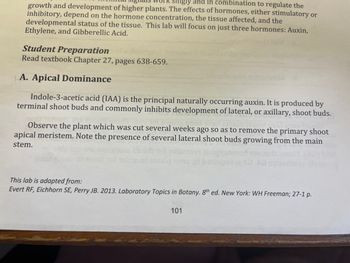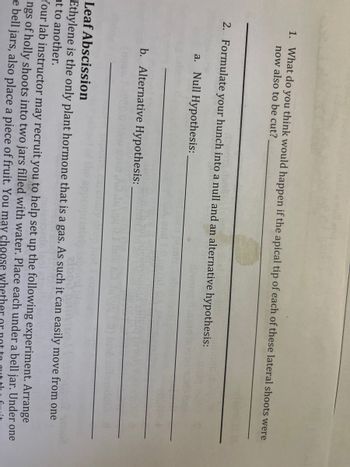
Human Anatomy & Physiology (11th Edition)
11th Edition
ISBN: 9780134580999
Author: Elaine N. Marieb, Katja N. Hoehn
Publisher: PEARSON
expand_more
expand_more
format_list_bulleted
Concept explainers
Question

Transcribed Image Text:PR Singly and in combination to regulate the
growth and development of higher plants. The effects of hormones, either stimulatory or
inhibitory, depend on the hormone concentration, the tissue affected, and the
developmental status of the tissue. This lab will focus on just three hormones: Auxin,
Ethylene, and Gibberellic Acid.
Student Preparation
Read textbook Chapter 27, pages 638-659.
LA. Apical Dominance
Indole-3-acetic acid (IAA) is the principal naturally occurring auxin. It is produced by
terminal shoot buds and commonly inhibits development of lateral, or axillary, shoot buds.
Observe the plant which was cut several weeks ago so as to remove the primary shoot
apical meristem. Note the presence of several lateral shoot buds growing from the main
stem.
This lab is adapted from:
Evert RF, Eichhorn SE, Perry JB. 2013. Laboratory Topics in Botany. 8th ed. New York: WH Freeman; 27-1 p.
101

Transcribed Image Text:1. What do you think would happen if the apical tip of each of these lateral shoots were
now also to be cut?
2. Formulate your hunch into a null and an alternative hypothesis:
a. Null Hypothesis:
b. Alternative Hypothesis:
Leaf Abscission
Ethylene is the only plant hormone that is a gas. As such it can easily move from one
nt to another.
Your lab instructor may recruit you to help set up the following experiment. Arrange
ngs of holly shoots into two jars filled with water. Place each under a bell jar. Under one
e bell jars, also place a piece of fruit. You may choose wheth
Expert Solution
This question has been solved!
Explore an expertly crafted, step-by-step solution for a thorough understanding of key concepts.
This is a popular solution
Trending nowThis is a popular solution!
Step by stepSolved in 3 steps

Knowledge Booster
Learn more about
Need a deep-dive on the concept behind this application? Look no further. Learn more about this topic, biology and related others by exploring similar questions and additional content below.Similar questions
- 13. Humans come from monkey's. Group of answer choices a.True b.Falsearrow_forward4. A student investigated the effect of plant growth substances (IAA and GA) on the elongation of pea stems, the students marked a 10mm length of stem on each of four plants and applied growth substances to the stem. Figure 2 shows a graph of the student's results. Length of stem section (mm) 161 14- 12- 10+ 0 Describe b) c) Suggest a suite 10 ************ 20 30 Time (h) 40 IAA and GA IAA GA control 50 60 minem & wth of the co crease in length of 4.9mm. The movime after application of growth substances was 4.2min. Calculate the percentage mereas (2) treatment for the control (2 d) Suggest how the student could have improved their investigation (5) sepere *********** ************arrow_forwardYou are testing to determine if fertilization with phosphorus (P), nitrogen (N), or a mixture of both (P+N) increases Douglas fir seedling growth in a greenhouse. 1. Describe one possible control variable of this experimentarrow_forward
- 7. Construct a UPGMA tree for the following distance matrix. Show values of branch lengths on the tree. A BUD с A 0 9 7 5 B 0 8 10 с 0 8 D 0arrow_forwardWhy would a scientist use asexual reproduction to grow two offspring of a plant, instead of using sexual reproduction? O The plants would be an exact genetic match. O The plants would have fewer recessive traits. O The plants would have greater genetic diversity. O The plants would be more likely to mutate. US %23 $4 4. & 6. 7 8 W a 8 h karrow_forwardQuestion 4 An increase in thickness of the hypodermis will _nerve sensitivity? Increase Decrease Cause no change in Question 10 French fries would test positive on the Sudan IV test and the iodine test because they are full of and O Fat, starch O Protein, starch O Sugar, starch O sugar, fat Question 15 In the experiment that you conducted with the touch calipers, areas with the greatest sensitivity had density of nerve receptors. O Lower O Same as the rest of the body O Higher O Doesn't have any correlation to sensitivity. Question 16 Margarine, butter, and cream cheese are a major source of which organic molecule? protein O fat carbohydrates nucleic acidsarrow_forward
- Choose all that applyarrow_forward3. A hypothesis must contain which of the following variables? tablvona fegnibenne variables 29 nozzl) a. only the dependent or responding variable b. only the dependent or manipulated variable OW shawens snoted vijuters dilida way Jer usy bayni and to 16 sk 3 miuton nsmngleza es batalo C. both the manipulated and responding variable d. both the manipulated and responding variables, as well as all the controlled variablesarrow_forward1. Using the Galapagos finches as an example, answer the following questions:arrow_forward
- 1) Design an experiment based on fruit ripening and ethylene: (1 or 2 sentences is fine) Hypothesis: Independent variable: Dependent variable: Control (describe at least 2): Describe the control group: Method: Create a graph/table of your expected results. Label all axes and give the graph/table a name.arrow_forward11. Can you think of any biological structure in a given environment where the most adaptive state may actually be the condition where the SA:V ratio is actually minimized? In other words, when may it be a selective disadvantage to have a high surface area relative to the given volume?arrow_forward4. In science, we tend to be precise when it comes to definitions. For example, in botanical terms, a "true" berry is defined as a "fleshy fruit developed from a single ovary and having a few or many seeds, but not a single stone." (Stones are hard seeds). Based on this definition, which of the following are considered as true berries? Check all that apply. Tomato Banana Cherry Plum Strawberry Peach Coconut Grape 5. Fruits and seeds often have adaptations to aid in dispersal. View the following list of fruits/seeds and identify the mode of dispersal (water, wind, attachment, mechanical (forceful discharge), animal spoor (animal feces), burial by animals. Match each of the following seeds with its dispersal method. a. Animals (via attachment) b. Animals (via feces) C. Mechanical d. Water e. Wind Beans (or peapods) Dandelion Berry Maple Cocklebur Pine Coconut Vetch 6. We depend on angiosperms for survival. The majority of the food that we eat are angiosperm seeds and fruits. Eighty-seven…arrow_forward
arrow_back_ios
SEE MORE QUESTIONS
arrow_forward_ios
Recommended textbooks for you
 Human Anatomy & Physiology (11th Edition)BiologyISBN:9780134580999Author:Elaine N. Marieb, Katja N. HoehnPublisher:PEARSON
Human Anatomy & Physiology (11th Edition)BiologyISBN:9780134580999Author:Elaine N. Marieb, Katja N. HoehnPublisher:PEARSON Biology 2eBiologyISBN:9781947172517Author:Matthew Douglas, Jung Choi, Mary Ann ClarkPublisher:OpenStax
Biology 2eBiologyISBN:9781947172517Author:Matthew Douglas, Jung Choi, Mary Ann ClarkPublisher:OpenStax Anatomy & PhysiologyBiologyISBN:9781259398629Author:McKinley, Michael P., O'loughlin, Valerie Dean, Bidle, Theresa StouterPublisher:Mcgraw Hill Education,
Anatomy & PhysiologyBiologyISBN:9781259398629Author:McKinley, Michael P., O'loughlin, Valerie Dean, Bidle, Theresa StouterPublisher:Mcgraw Hill Education, Molecular Biology of the Cell (Sixth Edition)BiologyISBN:9780815344322Author:Bruce Alberts, Alexander D. Johnson, Julian Lewis, David Morgan, Martin Raff, Keith Roberts, Peter WalterPublisher:W. W. Norton & Company
Molecular Biology of the Cell (Sixth Edition)BiologyISBN:9780815344322Author:Bruce Alberts, Alexander D. Johnson, Julian Lewis, David Morgan, Martin Raff, Keith Roberts, Peter WalterPublisher:W. W. Norton & Company Laboratory Manual For Human Anatomy & PhysiologyBiologyISBN:9781260159363Author:Martin, Terry R., Prentice-craver, CynthiaPublisher:McGraw-Hill Publishing Co.
Laboratory Manual For Human Anatomy & PhysiologyBiologyISBN:9781260159363Author:Martin, Terry R., Prentice-craver, CynthiaPublisher:McGraw-Hill Publishing Co. Inquiry Into Life (16th Edition)BiologyISBN:9781260231700Author:Sylvia S. Mader, Michael WindelspechtPublisher:McGraw Hill Education
Inquiry Into Life (16th Edition)BiologyISBN:9781260231700Author:Sylvia S. Mader, Michael WindelspechtPublisher:McGraw Hill Education

Human Anatomy & Physiology (11th Edition)
Biology
ISBN:9780134580999
Author:Elaine N. Marieb, Katja N. Hoehn
Publisher:PEARSON

Biology 2e
Biology
ISBN:9781947172517
Author:Matthew Douglas, Jung Choi, Mary Ann Clark
Publisher:OpenStax

Anatomy & Physiology
Biology
ISBN:9781259398629
Author:McKinley, Michael P., O'loughlin, Valerie Dean, Bidle, Theresa Stouter
Publisher:Mcgraw Hill Education,

Molecular Biology of the Cell (Sixth Edition)
Biology
ISBN:9780815344322
Author:Bruce Alberts, Alexander D. Johnson, Julian Lewis, David Morgan, Martin Raff, Keith Roberts, Peter Walter
Publisher:W. W. Norton & Company

Laboratory Manual For Human Anatomy & Physiology
Biology
ISBN:9781260159363
Author:Martin, Terry R., Prentice-craver, Cynthia
Publisher:McGraw-Hill Publishing Co.

Inquiry Into Life (16th Edition)
Biology
ISBN:9781260231700
Author:Sylvia S. Mader, Michael Windelspecht
Publisher:McGraw Hill Education